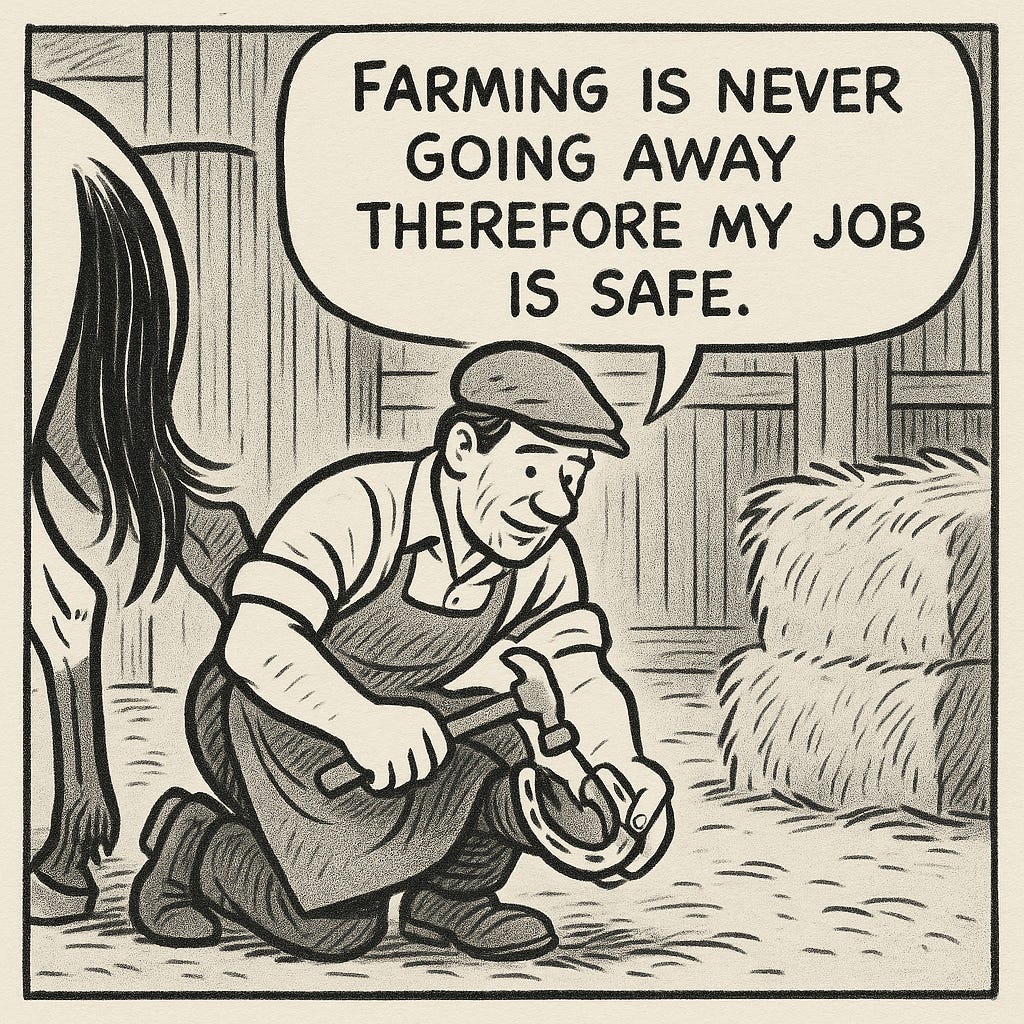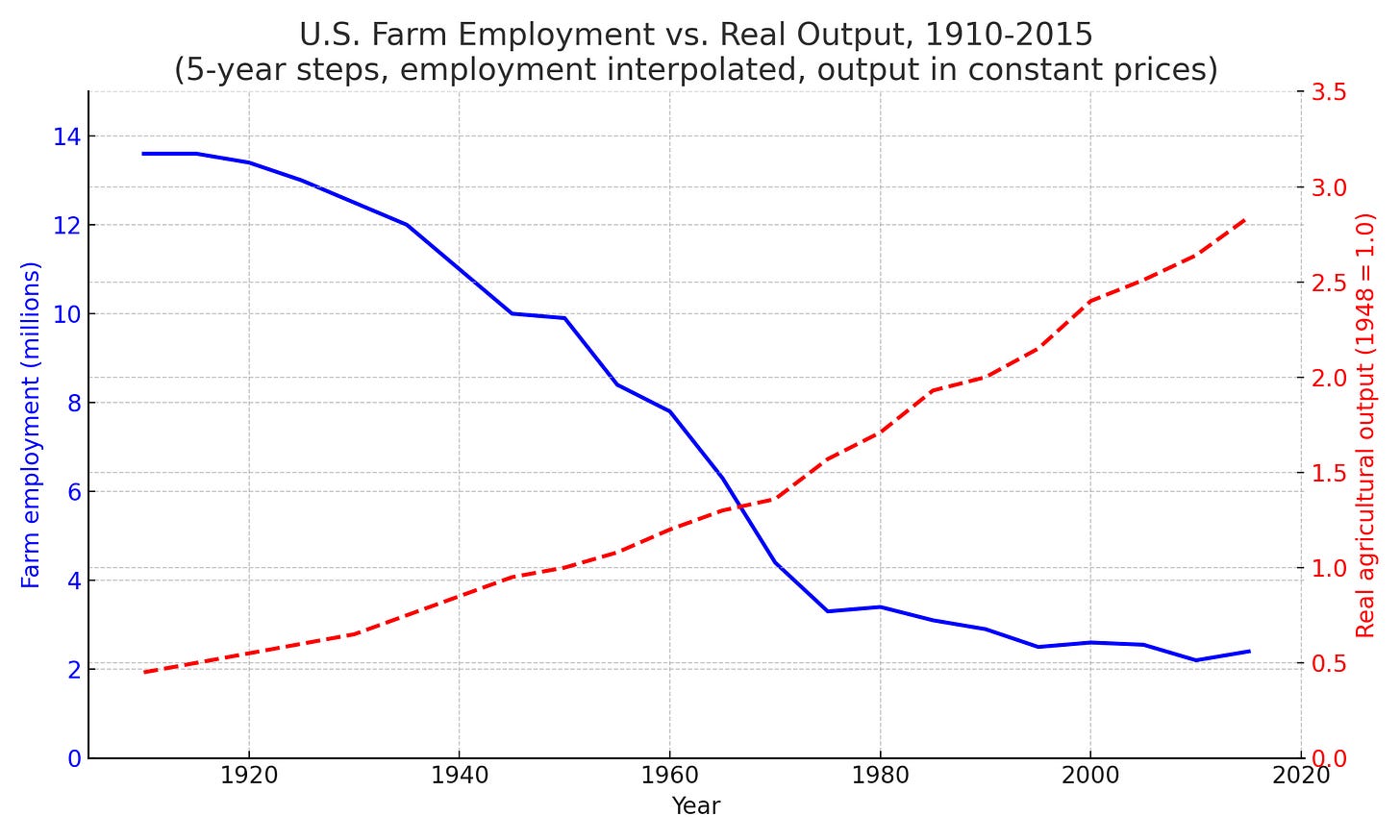Memetic Warfare 101: Viral Memes about AI Job Loss
How I'm using memes and AI to spread the word about AI, jobs, and Post-Labor Economics. We've tried warning people with history and data, now it's time to break out the memes.
As internet culture has saturated the world, memes have taken on a new gravitational weight. My wife’s digital rhetoric professor defined a meme as a “the smallest unit of culture.” That’s a fitting definition once you reflect on it.

What is “memetic warfare”? Memetic warfare is to memes what drone warfare has become in Ukraine. My cousin and I were building remote controlled aircraft back in the late 90’s and early 2000’s, including radio controlled rockets. We had remote controlled aircraft and helicopters and what today you just call “drones.” It occurred to me back then “these could easily be weaponized” but of course we were not systematically attempting to hunt down Russian snipers in the hinterlands of Ukraine. Our basement projects were the ‘Pepe’ equivalent of a technology that has now matured.
Drone warfare in Ukraine has gone through rapid innovations, almost a natural high pressure of evolution and selection. First, they were all radio controlled, then jammers were brought in, and now all the FPV (first person video) drones are controlled with spools of fiberoptic wires—unhackable and radio silent. Just as drone warfare has now been professionalized, so too has meme warfare.

Many people today react to AI and robotics saying “my job is too complex to automate!” To which I respond with a job that no longer exists as we understand it today. This meme went viral, with over a million views overnight. A few commenters pushed back “well, technically, there are over 100 million sewers today!” It’s true that seamstresses were not prestigious jobs even during their height. However, comparing a decent middle class lady’s job in the West to a sweat shop factory job that pays starvation wages in Thailand today is a bit of a stretch. Other commenters pointed out “this is so typical… men coming in to take women’s work.” I hadn’t thought of it that way!
But that’s the power of a good meme. It carries a lot of epistemic and cultural baggage and thus serves as a bit of a Rorschach test: people see what they want to see in it.

This meme didn’t do quite so well, I think likely because many people are not as aware of the history of aircraft. It seems so obvious in hindsight that the biplane would soon give way to the monoplane, the jetfighter, and even gigantic airliners. People take it for granted that technology improves over time—but only in hindsight.
I made this meme to push back against the people who criticize AI as it is today. “It still can’t do X! Ha ha.” To which I usually just respond “Golly gee, you’re right! I never thought of that! This brand new technology that you didn’t even know about 2 years ago has clearly reached it’s zenith and will never improve from here on out!”

By the time this meme rolled off the press, people were on to my game. They said “yeah, but now there are tractor engineers and tractor mechanics!” Which is true. But the point the of this meme is to warn developers and coders that “just because software is never going away doesn’t mean your job isn’t.” Microsoft and Google already generate 30% of their code with AI, and this technology is still in its infancy. It would be quite silly to assume that the need for developers will rise indefinitely. In fact, forecasts show that the global total number of developers is expected to rise for only a few more years, perhaps reaching it’s apogee by 2028 to 2032. After that, it’s going to follow the same curve as manufacturing. In absolute terms, US manufacturing employment peaked in 1979. America now employs only half of that number today in 2025, even though total manufacturing output has continued to climb. This is the nature of automation. Whether or not automation ultimately creates more jobs (which is still hotly debated) the point is that your current job is toast.

The same thing has happened with agriculture. Statistically speaking, farming jobs in absolute numbers peaked in America in the 1910 census with over 12 million farm jobs. Today, that number is down to 2.5 million. Farm jobs, in absolute terms, have collapsed 80% even though farming output is roughly 600% higher than it was in 1910. But once again, most people are not trained to have a good intuitive sense of the math. AI is doing the same thing to coding that industrialization did to farming—you need a tiny fraction of the same number of people to dramatically increase your output!

I’m sure there were plenty of farmers who couldn’t imagine automating their job away. As people are saying today “it’s not that a machine will take your job, it’s someone else using the machine who will take your job!”

This horse-tractor meme leans into the absurd. Not only is that farmer now out of a job, so is the horse as well as even the tractor (which has since been replaced by larger, more sophisticated equipment).

What do you do when a tool can code better than most developers, can diagnose medical issues better than most doctors, and can provide legal counsel better than most lawyers, and that tool is only $20 per month?
You go all in on that tool.
The primary cognitive failure here is “normalcy bias.” Despite what many humans believe about themselves, it’s actually pretty hard to image the world we know changing. This makes sense from an evolutionary perspective. Eons could pass with very few paradigm shifts. One generation to the next would live the same lifestyles, under the same seasons, and with the same technology. We have simply not evolved to intuitively understand fundamental shifts in lifestyle and technology during our lifespans.

Now the question becomes “who does AI really benefit?” Whether it’s manufacturing or farming, if you compare white collar work to those jobs, and we can surmise that many knowledge worker jobs are going away, who really benefits?
The owners of capital of course!

It’s somewhat ironic: globally, 60% to 80% of people are burned out, disengaged, quiet quitting, or otherwise hate their jobs. Generally speaking, the more developed a nation is, the higher that ratio. No one is happy. Yet, when I tell people “AI is going to take your jobs and liberate you to pursue your meaning” some people say “where am I going to get my sense of purpose from?”
Most people are already checked out and derive very little meaning from work???
What if we just let go of these notions and embrace the future?
I suspect we’ll look back at the current era and think that wage slavery was not much better than actual slavery. “You mean you had to work for someone else or you starved? You went homeless? How barbaric!”







I love these on point comics. They really nail there specific paintings.
Funny, I just finished a story about one possible AI-driven future. Check it out! https://sisyphusofmyth.substack.com/p/in-the-garden-of-eden-baby